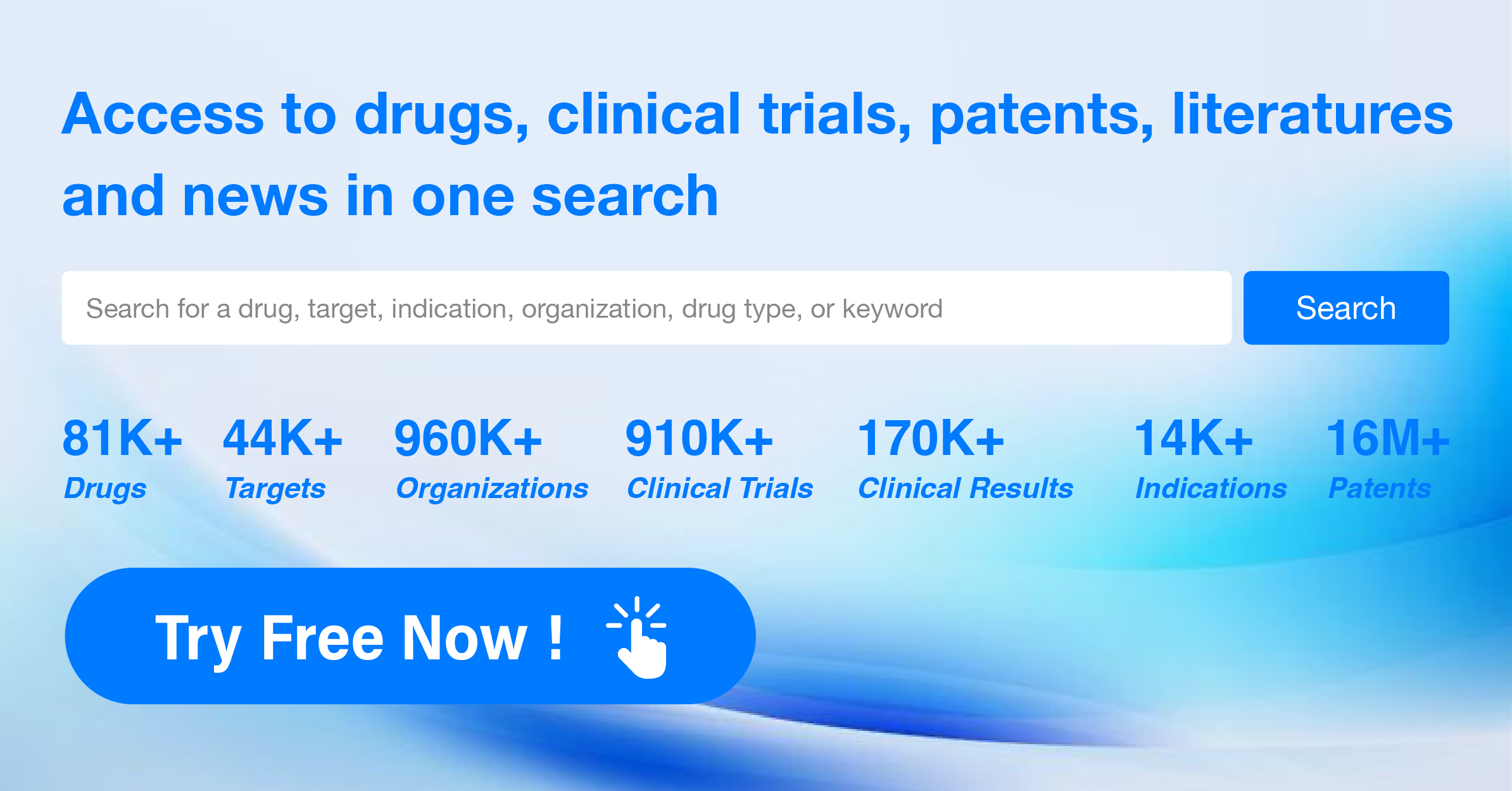Pharma Frontiers: Daily Digest of Global Pharmaceutical News - April 13
1.BMS's Luspatercept Files for New Indication in China for the Treatment of Myelodysplastic Syndromes
On April 12th, the CDE website showed that BMS's application for a new indication for Luspatercept has been accepted. Based on the progress of clinical trials, the new indication is speculated to be Myelodysplastic Syndromes (MDS). Luspatercept is the world's first erythroid maturation agent, designed to regulate late-stage red blood cell maturation and to increase hemoglobin levels. In November 2019, Luspatercept was first approved in the United States for the treatment of transfusion-dependent β-thalassemia patients. In April 2020, Luspatercept received approval for a new indication to treat anemia associated with MDS with ring sideroblasts or myelodysplastic/myeloproliferative neoplasms with ring sideroblasts and thrombocytosis in patients who were unresponsive to erythropoiesis-stimulating agents (ESAs) and required regular red blood cell transfusions, with a transfusion need of ≥2 units/8 weeks. In August 2023, Luspatercept was approved by the FDA for the treatment of adult patients with very low to intermediate-risk MDS who have not been treated with an erythropoiesis-stimulating agent and might require regular red blood cell transfusions.
The open-label, randomized, active-controlled phase III COMMANDS study evaluated the efficacy and safety of Luspatercept in comparison to the erythropoiesis-stimulating drug epoetin alfa for the treatment of anemia in patients with very low to intermediate-risk MDS. The study's primary endpoint was red blood cell transfusion independence (RBC-TI) at week 12, with the mean hemoglobin level increase of ≥1.5 g/dL. Key secondary endpoints included RBC-TI at 24 weeks, RBC-TI lasting 12 weeks or more, and an erythroid response during at least 8 of the first 24 weeks.
2. Expansion to children aged 6-11, AstraZeneca's IL-5Rα monoclonal antibody receives FDA approval again
On April 11, AstraZeneca's IL-5Rα monoclonal antibody Fasenra (benralizumab) was approved by the U.S. FDA to expand the treatment population to include children aged 6 to 11 years with severe asthma of the eosinophilic phenotype for add-on maintenance therapy. Benralizumab was originally developed by Kyowa Kirin, and in December 2006, MedImmune reached an agreement with the company to acquire the commercial rights for benralizumab in the United States, Europe, and other countries. In April 2007, AstraZeneca acquired MedImmune for $15.6 billion, incorporating a pipeline of 45 investigational products. In October 2016, AstraZeneca expanded its commercial rights for benralizumab to Japan. In March 2019, AstraZeneca entered into a new licensing agreement with Kyowa Kirin, securing the rights to develop and commercialize benralizumab in Asia, as well as global commercialization rights.
Benralizumab can bind directly to the IL-5 receptor α on eosinophils and attract natural killer cells to induce apoptosis (programmed cell death), leading to rapid and near-total depletion of eosinophils. In November 2017, benralizumab was first approved in the United States under the trade name Fasenra for add-on maintenance treatment of patients aged 12 and older with severe eosinophilic asthma. The approval for expanded use is based on an open-label, multinational, non-randomized, parallel-group, phase III TATE trial, as well as evidence from well-controlled trials conducted in adult and adolescent populations. In the TATE study, Fasenra met its primary endpoint, demonstrating consistent pharmacokinetics (PK) and pharmacodynamics (PD) in children aged 6 to 11 with the SEA phenotype as in previous trials. The safety and tolerability profile of Fasenra were also consistent with the known profile of the drug.
3. CSPC Pharmaceutical Initiates Phase III Clinical Trial for First-Line Treatment of NSCLC with EGFR Monoclonal Antibody Combined with Osimertinib
On April 11th, the clinical trial registry and information public platform showed that CSPC Pharmaceutical's anti-epidermal growth factor receptor (EGFR) monoclonal antibody becotatug (JMT101) has initiated a new Phase III clinical trial (n=398), intending to assess the efficacy and safety of JMT101 combined with osimertinib and cisplatin plus pemetrexed as a first-line treatment for advanced non-small cell lung cancer (NSCLC) with EGFR exon 20 insertion mutations (EGFR 20ins).
JMT101 is a recombinant humanized anti-EGFR monoclonal antibody developed by CSPC's subsidiary JMT Biological Technology, and it entered into Phase I clinical trials for the first time in December 2016. In vitro studies have shown that JMT101 has an affinity for human EGFR that is approximately 7 times that of cetuximab; JMT101 and cetuximab have similar Antibody-Dependent Cell-Mediated Cytotoxicity (ADCC) and Complement-Dependent Cytotoxicity (CDC) effects. In January of this year, CSPC Pharmaceutical presented the results of the Phase II BECOME study of JMT101 combined with osimertinib in treating patients with locally advanced or metastatic NSCLC carrying EGFR 20ins at the European Lung Cancer Congress (ELCC). This study was a single-arm, multi-center, open-label clinical trial (n=126), in which the enrolled patients were treated with JMT101 (6mg/kg, IV infusion, biweekly) + osimertinib (160mg, orally, once daily). The results, as of December 21st, 2023, showed that in the Intention-To-Treat (ITT) population (n=112), the confirmed objective response rate (cORR) assessed by the Independent Review Committee (IRC) was 50.0%, and the disease control rate (DCR) was 79.5%. The median duration of response (DoR) was 6.4 months; the median progression-free survival (PFS) was 6.9 months, with a 6-month PFS rate of 57.7%, and a 12-month PFS rate of 31.0%; the median overall survival (OS) was 17.2 months, with median DoR, PFS, and OS data still maturing.
4.Significant Reduction in Abdominal Fat! Lipocine Announces Positive Data for Innovative Therapy LPCN 2401
On April 12, Lipocine Inc. announced positive results from its Phase 2 clinical trial of the investigational therapy LPCN 2401. The analysis indicated that treatment with LPCN 2401 led to a significant increase in lean muscle mass (LM) and a notable reduction in fat mass (FM) in patients who were obese or overweight and had at least one weight-related comorbidity.
According to the press release, LPCN 2401 has the potential to be used in combination with glucagon-like peptide-1 (GLP-1) class drugs, or as a monotherapy to maintain patient weight after discontinuation of such therapies. This multicenter Phase 2 trial included participants who were either obese (BMI≥30) or overweight (BMI≥27), with at least one weight-related comorbidity such as hypertension, type 2 diabetes, or dyslipidemia. Subjects were randomly assigned to one of three treatments for a duration of 36 weeks: (A) testosterone ester capsules alone, (B) LPCN 2401, or (C) placebo. They underwent dual-energy X-ray absorptiometry (DEXA) scans at baseline, week 20, and week 36 to measure body composition. Among the patients treated with treatments B and C, 27 subjects were randomly allocated and completed baseline and at least one post-baseline DEXA analysis. At baseline, the subjects had an average BMI of 36.0 kg/m^2 and a mean age of 52.4 years old. The analysis revealed that, at 36 weeks, treatment with LPCN 2401 resulted in a 4.4% increase in LM and a 6.7% decrease in FM compared to placebo. Significant improvements in body composition were observed as early as week 20. Furthermore, treatment with LPCN 2401 also decreased abdominal fat (AF) by 4.1% and increased bone mineral content (BMC) by 2.8%. The drug treatment had no impact on patient weight, as the reduction in fat was offset by an increase in lean body mass. Overall, treatment with LPCN 2401 significantly improved body composition, significantly lowering the fat/muscle mass ratio in patients.
5.TransThera Sciences Announces Study Results for FGFR Inhibitor
On April 12, TransThera Sciences announced the latest research findings of its leading product tinengotinib, targeting late-stage solid tumors with FGFR1-3 mutations (as a monotherapy), at the 2024 American Association for Cancer Research (AACR) Meeting. These clinical outcomes were also selected for the Late-Breaking Research session of the AACR conference. Mutations in the fibroblast growth factor receptor (FGFR) are prevalent in a variety of malignancies and are common oncogenic drivers. FGFR inhibitors have been proven effective for certain tumors that carry FGFR mutations.
Tinengotinib is a novel, innovative, kinase-spectrum selective small molecule inhibitor developed by TransThera Sciences, which exerts an anti-tumor effect by targeting tumor cells and improving the tumor microenvironment. The product is undergoing a global multicenter phase 3 clinical trial for cholangiocarcinoma in China, the United States, South Korea, Europe, and other regions. According to a press release from TransThera Sciences, tinengotinib binds very specifically to FGFR, retaining high activity against a range of FGFR1-3 mutations. These mutations include gatekeeper mutations, molecular brake mutations, and irreversible inhibitor binding site mutations, which are distinctive features of the product and demonstrate the potential of tinengotinib for treating a broad spectrum of cancers with FGFR mutations. At the conference, TransThera Sciences presented a summary of study data on patients with late-stage solid tumors carrying FGFR1-3 mutations treated with tinengotinib. The Best Objective Response Rate (BoR) was 33.3%, the Disease Control Rate (DCR) was 88.2%, and the median Progression-Free Survival (mPFS) was 6.90 months. The press release indicated that these positive clinical results validate the therapeutic potential of tinengotinib for tumors with FGFR mutations.
6.TYK Medicines' YAP/TEAD inhibitor approved for clinical trials in the United States
On April 11, TYK Medicines announced that its independently developed new generation oral, highly efficient, and highly selective small-molecule YAP/TEAD inhibitor, TYK-01054, received approval from the US FDA to commence clinical trials. TYK Medicines has also engaged in Pre-IND communication with the Chinese NMPA regarding this product and will soon officially submit an IND. Hippo is a classical signaling pathway that can dramatically regulate organ size, and its mutations lead to tissue overgrowth, which exhibited phenotypes in fruit flies reminiscent of a "hippopotamus," hence the name Hippo. The Hippo signaling pathway also plays a significant role in rapidly growing tumors. Studies have shown that approximately 10% of patients with all cancer types exhibit genetic alterations in their Hippo pathway. According to literature, YAP, TAZ, and TEAD are downstream effectors of the Hippo pathway. Since YAP/TAZ lack distinct druggable pockets or catalytic sites, the discovery of a conserved central lipid pocket on TEAD provided one of the potential avenues for therapeutic intervention in the Hippo/Yap pathway.
TYK-01054 is a small-molecule YAP/TEAD inhibitor intended to treat various advanced cancers, such as malignant mesothelioma, head and neck squamous cell carcinoma, esophageal cancer, pancreatic cancer, neurofibromas, and sarcomas. Preclinical studies have shown that the product can bind to TEAD and inhibit the expression of TEAD downstream genes. Other preclinical study results indicate that dysregulation of YAP/TAZ/TEAD signaling may be a primary mechanism by which patients develop intrinsic and acquired resistance to various targeted therapies and chemotherapy. Currently, the FDA-approved drugs that indirectly block YAP/TAZ activation or key downstream targets of YAP/TAZ have shown clinical outcomes in reducing treatment resistance. Therefore, the direct inhibition of the YAP/TAZ/TEAD signaling pathway by the small-molecule oral candidate drug TYK-01054 may offer tangible hope to tumor patients experiencing drug resistance.
7.Novartis acquires potential "best-in-class" protein degrader from Arvinas for over $1 billion!
On April 12th, Arvinas announced that it had entered into an exclusive strategic licensing agreement with Novartis. Novartis will obtain worldwide rights to develop and commercialize Arvinas’s second-generation androgen receptor (AR) targeting PROTAC (proteolysis targeting chimera) ARV-766 with payments of up to $1.01 billion. Novartis also gains access to another AR-targeting PROTAC degrader, AR-V7, which is in preclinical stages.
ARV-766 is an oral, potentially "first-in-class" and "best-in-class" PROTAC protein degrader designed to selectively degrade androgen receptors with clinically relevant point mutations, including the L702H mutation. The prevalence of all AR ligand binding domain (LBD) mutations, especially AR L702H, increases over time with the disease. Approximately 25% of tumors harbor these mutations after initial treatment with novel hormonal agents (NHAs) such as enzalutamide or abiraterone, which are the target patient population for ARV-766. ARV-766 achieved a ≥50% reduction in prostate-specific antigen (PSA) levels (PSA50) in 41% of mCRPC patients with any LBD mutation and delivered PSA50 for 50% of mCRPC patients with AR L702H mutation tumors. Additionally, ARV-766 demonstrated good tolerability. The data on progression-free survival (PFS) for this trial is expected to be published in 2024. Based on the data, Arvinas plans to initiate a phase 3 clinical trial targeting mCRPC with ARV-766 as a priority and is scheduled to discuss with regulatory bodies in the second quarter of 2024. As per the terms of the transaction agreement, Novartis will be responsible for the global clinical development and commercialization of ARV-766 and will have the rights to all research, development, manufacturing, and commercialization associated with the preclinical AR-V7 project. Arvinas will receive a total upfront payment of $150 million. Under the licensing agreement, Arvinas is eligible to receive up to an additional $1.01 billion in potential development, regulatory, and commercial milestones.
8. Eliem Completes $120 Million Financing to Support Acquisition, Securing Potentially "Best-in-Class" Therapies
On April 12th, Eliem Therapeutics finalized an acquisition agreement with Tenet Medicines, per which Eliem will complete its acquisition of Tenet. The merged entity will focus on advancing the development of its leading therapy, TNT119, a targeted antibody drug against CD19, which aims to treat a variety of autoimmune diseases, including systemic lupus erythematosus, immune thrombocytopenia, and membranous nephropathy, among others. To support this acquisition, Eliem also completed a financing round of $120 million. The financing was backed by new and existing investors, including RA Capital Management, Deep Track Capital, Boxer Capital, Janus Henderson Investors, Pontifax, and Samsara Biocapital.
Tenet's lead product TNT119 is a CD19-targeted antibody designed to achieve broad and profound depletion of pathogenic B cells, with good tolerability and a convenient administration schedule, and it may be suitable for subcutaneous administration. The strategic approach post-merger will be to conduct clinical proof-of-concept studies of the therapy, aiming to develop TNT119 for the treatment of a range of autoimmune-mediated diseases. The primary indication for TNT119 is systemic lupus erythematosus, the most common type of lupus and autoimmune disease where the patient's immune system attacks their own tissue, leading to widespread inflammation and tissue damage in affected organs, including the joints, skin, brain, lungs, kidneys, and blood vessels. In systemic lupus erythematosus, the underlying pathological mechanism involves autoreactive B cells producing autoantibodies, forming immune complexes that lead to inflammation and tissue injury. TNT119 aims to target and deplete CD19 positive B cells that produce autoantibodies, thereby offering a new approach to the potential treatment of systemic lupus erythematosus. The combined company expects to initiate Phase 2 clinical trials of TNT119 for the treatment of systemic lupus erythematosus and immune thrombocytopenia in the second half of 2024.




